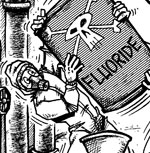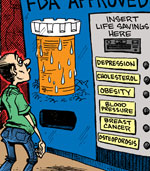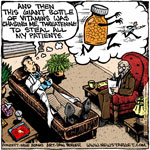The Cure for Vitamin B3 Deficiency and More
| Share on Facebook | Share on Twitter | Share on Google+ |
It helps in facilitating the processes that are involved in the proper metabolism of fats, carbohydrates and proteins. It is also involved in over 50 enzymatic reactions. Considering these important functions, you might now have a bird's eye view of what might happen to those who have vitamin B3 deficiencies. 
As a matter of fact, vitamin B3 is widely available in the food that we eat. Considering that the RDA for niacin is just 16 mg for men and 14 mg for women, there are only very rare cases of niacin deficiency. Pellagra, a classic vitamin B3 deficiency condition marked by scaly irritated skin and loss of appetite, to memory loss and depression in more severe cases, occur rather rarely these days.
Sources of Vitamin B3
There are many natural foods high in vitamin B3. All good sources of protein such as meats, poultry, fish and nuts are vitamin B3 foods as well. Those food sources rich in tryptophan , an amino acid used by the body to synthesize niacin, such as dairy products and eggs are also good sources of niacin. If you are a physiologically normal person who eats well-balanced meals, you are most probably not at risk for any vitamin B3 deficiency.
Symptoms of Vitamin B3 Deficiency
However, if you, for one reason or another, have even just a slight niacin deficiency, you will immediately feel the symptoms. These might include an overall feeling of fatigue, nausea, vomiting, forgetfulness, loss of appetite, skin lesions, headache, anemia, digestive system problems and difficulty in resting. When the vitamin B3 deficiency becomes severe, you may develop Pellagra, which would need immediate medical attention.
Other Uses of Vitamin B3
Although vitamin B3 deficiencies are rather uncommon nowadays, vitamin B3 supplementation and therapy has been seen to be effective in treating a wide range of other conditions. These conditions include the following:
Vitamin B3 and Schizophrenia. Many studies in the past 50 years have found the effectivity of niacin (and its niacinamide and inositol forms) in treating schizophrenia. This is based on the concept that vitamin B3 competes with the formation of adrenaline in the body, which is highly responsible for the hallucinogenic tendencies of schizophrenics.
Vitamin B3 and Acne. Niacin, most especially the topical niacinamide vitamin B3 form, has been scientifically proven to reduce acne. This effect stems from the fact that niacin helps in the proper absorption of fat in the body, thereby decreasing the tendency of oils and sebum to build up around the pores to cause breakouts.
Vitamin B3 and Multiple Sclerosis. Niacin plays a major role in keeping the nerves and brains functioning properly. In the same way, vitamin B3 in its nicotinamide form has also been seen to provide dramatic protection against multiple sclerosis (a disease characterized by self-destructive nerve fibers). It also protects further brain damage and complications during the late stages.
Though vitamin B3 deficiency is rare nowadays, supplementation with vitamin B3 (niacin and niacinamide) has found a new role in the modern world. Optimum doses of this vitamin been seen to treat a wide variety of conditions and will continue to do so for the years to come.
-
Skin CareMen Skin Care
-
Free ResourcesFree eBooks
-
Every patient carries her or his own doctor inside.Albert Schweitzer
-
Featured Health Supplement
 If you find a product that is as effective as Total Balance, and is better value for money, let us know and we will give you a refund equivalent to your entire purchases of Total Balance…retrospective.
If you find a product that is as effective as Total Balance, and is better value for money, let us know and we will give you a refund equivalent to your entire purchases of Total Balance…retrospective.
-



















